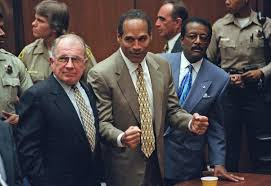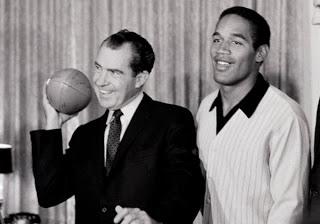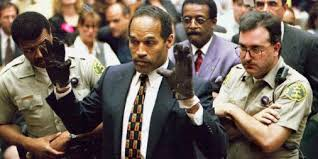 As someone six years old when the O.J. Simpson drama unfolded, I can't claim any particular attachment to the "Trial of the Century." My parents can still recall trial details from memory, but aside from scattered memories of white broncos and ill-fitting gloves, nothing registered with me. Which made it odd that, twenty-two years later, ESPN and FX each decided to revisit the subject, one with a documentary, the other a dramatic miniseries.
As someone six years old when the O.J. Simpson drama unfolded, I can't claim any particular attachment to the "Trial of the Century." My parents can still recall trial details from memory, but aside from scattered memories of white broncos and ill-fitting gloves, nothing registered with me. Which made it odd that, twenty-two years later, ESPN and FX each decided to revisit the subject, one with a documentary, the other a dramatic miniseries. Two decades later, it's hard to fathom what all the fuss was about. Shorn of the media hype, it's another case of a millionaire with expensive lawyers, springing their client on a morally dubious defense. The case has its dramatic merits and undeniable human tragedy, yet it's not intrinsically more interesting than the largely-forgotten trials of Claus Von Bulow or T. Cullen Davis. Nor does delving into minutia prove especially rewarding. There's no insight gained from probing Kato Kaelin or Janet Resnick, aside from bemoaning the ubiquity of unearned fame.
But, as both O.J.: Made in America and American Crime Story: The People Vs. O.J. Simpson remind us, facts can't be separated from the hype. The never-ending trial, full of melodramatic twists and provocative lawyering, became a national soap opera rivaled only by the Watergate and Clinton impeachment hearings, with a sociocultural impact far outpacing its squalid details.
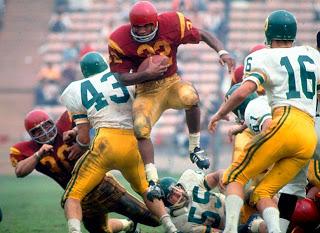 O.J.: Made in America, a sprawling, seven-plus hour documentary from Ezra Edelman, benefits immensely from its format. Edelman spends over two hours sketching O.J.'s background and cultural footprint before getting anywhere near the trial, allowing for younger viewers who only know Simpson the (alleged) killer to grasp why the trial meant so much. Here was a media presence, unique in his time (and arguably today), transcending racial and professional boundaries, gaining universal respect until he unveils his dark side.
O.J.: Made in America, a sprawling, seven-plus hour documentary from Ezra Edelman, benefits immensely from its format. Edelman spends over two hours sketching O.J.'s background and cultural footprint before getting anywhere near the trial, allowing for younger viewers who only know Simpson the (alleged) killer to grasp why the trial meant so much. Here was a media presence, unique in his time (and arguably today), transcending racial and professional boundaries, gaining universal respect until he unveils his dark side.Born in San Francisco's Potrero Hill neighborhood, O.J. overcame a hardscrabble childhood. He suffered from poverty, brushes with crime, and a distant, troubled father who later came out as gay. Even in his early days, O.J.'s friends recall him using charm to avoid trouble, not always with success. After a brief stint in prison and a visit from baseball great Willie Mays. O.J. remakes himself as a star football player.
As a running back at USC, and later in the National Football League, Simpson establishes himself as an athlete for all audiences. Clean-cut and filled with boundless charisma, he wowed the media, charmed fans and earned a niche transcending race. By using copious game footage, Edelman allows viewers to appreciate Simpson's remarkable athletic talent (winning a Heisman Trophy, breaking the NFL's single-season rushing record with Buffalo), yet it's apparent that his appeal transcends his ability to carry a football.
Because it wouldn't be a Groggy article without a Nixon cameo
For O.J. came of age in the tumultuous '60s, while standing apart from them. He attended USC as Los Angeles reeled from the Watts Riots and exposure of police racism, which boosted the profile of young lawyer Johnnie Cochran. Yet O.J. and his teammates couldn't care less. At a time when America's racial tension burned at a fever pitch, Simpson purposely distanced himself from activism, providing a contrast to the uppity likes of Muhammad Ali, Jim Brown and Tommie Smith.Edelman shows Simpson's rejection of race ("I'm not black, I'm O.J.!") by spotlighting his famous 1978 Hertz commercial. O.J. rushes through a crowded airport to his waiting rental car, cheered by whites charmed by his charisma and awed by his running skills ("Run, O.J.!" shouts an approving matron). This commercial demonstrates in stark relief O.J. as America's ideal black athlete, likeable and non-threatening, beloved by everyone he meets. In other words, the Sidney Poitier of football.
Simpson parlayed his sports fame and charm into a varied celebrity career: sports commentator, pitchman and movie star, charming audiences in films like Capricorn One and the Naked Gun series. He increases his distance from the black community, moving into LA's swanky Brentwood district, hobnobbing with city officials, CEOs and cops and marrying model Nicole Brown. Behind the scenes, too, he abuses Brown while partying and womanizing, indiscretions that his police friends keep under wraps.
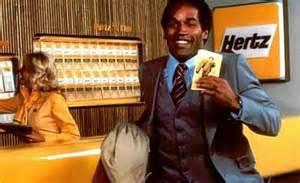
Frankly, Edelman's coverage of the crime and its fallout (the Bronco chase, the media coverage, the never-ending trial) might be the least interesting part of the documentary. He provides an adequate overview of the case's highlights, while interviewing many of the participants: prosecutor Marcia Clark, still resentful over Judge Lance Ito's misconduct and defense irresponsibility; defense attorneys F. Lee Bailey and Carl E. Douglas, smugly defending their racial grandstanding; and the odious Detective Mark Fuhrman, who endorses police brutality while squirming around his racist past. That said, there's little substantively new in these segments.
Yet Made in America fascinates showing O.J.'s rebirth as a martyr to racism. When flamboyant defense counsel Johnnie Cochran arrives on the scene, the trial becomes a referendum on the LAPD's long-standing racism and brutality, with African-Americans viewing the case as revenge against a system stacked against them. No matter that Simpson had little connection to the black community; this proved their case all the more. If even O.J., a rich athlete who succeeded playing by the white man's rules, could be framed and convicted, who else would be safe?
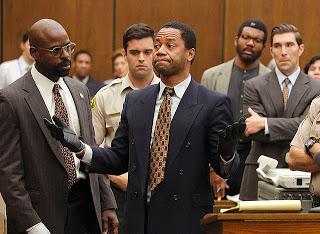
Murphy, erstwhile creator of Glee and American Horror Story, has never been known for restraint, which makes his tasteful approach commendable. Kato Kaelin's reduced to a functional cameo, and the relationship between prosecutors Marcia Clark (Sarah Paulson) and Christopher Darden (Sterling K. Brown) remains at the level of banter, mutual respect and handholding comfort. Even things
At worst, Murphy and his co-directors slam viewers with obnoxious style choices: intrusive smash zooms during F. Lee Bailey's (Nathan Lee) cross examination of Mark Fuhrman (Steven Pasquale), or obvious music cues (a party montage scored to "Everybody Dance Now," or Clark's makeover set to "Kiss of a Rose"). The weakest episode focuses on the plight of jurors sequestered throughout the interminable trial, pitched at an hysterical level the series otherwise avoids. Similarly, attempts at conveying the trial's media impact are hamfisted and obnoxious, including repeated Larry King cameos. To Murphy's credit, these are aberrations rather than the norm.
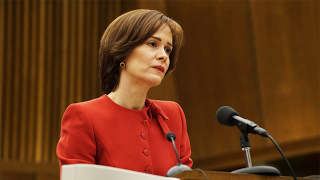
People's most sympathetic character is Marcia Clark, played with fierce, winning forcefulness by Sarah Paulson. Often caricatured as crabbed and arrogant in media portrayals of the trial, Clark becomes instead a determined heroine enduring continual media harassment (especially a fixation on her hairstyle and dress), nasty gibes from the public and onlookers and her ongoing divorce proceedings. She's the quintessential feminist, fighting through mountains of sexism to be taken seriously. Paulson's Clark holds our sympathy and respect throughout, a tough but not invulnerable protagonist seeking justice.
Sterling K. Brown's earnest, irritable Christopher Darden is another homerun. Cochran and Darden initially treat each other with wary respect; Cochran, himself a former Assistant DA, appreciates Darden's efforts to combat police misconduct. Yet Darden becomes an unwitting shield against racism for the prosecution, earning Cochran's contempt as he argues against use of the "n-word" and is bluffed into letting O.J. try on the bloody gloves. Brown's humor gives way to coarse resentment, bitterly telling Cochran that he's merely sprung a wealthy client rather than bettering race relations.
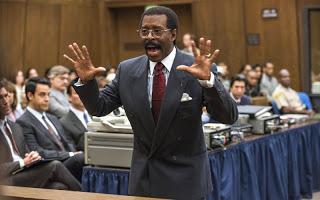
There are a few bum performances (or characterizations, perhaps) in the margins. Bruce Greenwood as Gil Garcetti can't go one scene without condescending to Clark or whining about the case's . Steven Pasquale's Mark Fuhrman is a one-note villain, coldly polite in public while polishing Nazi memorabilia at home. The biggest shortcoming is Cuba Gooding, Jr., straightjacketed by circumstances into inscrutable anger. He conveys little of O.J.'s distinct presence or charisma, though in fairness no one likely could have.
Made in America picks up the story after the trial with an anticlimactic portrait of decline. Shunned by his former friends, O.J. briefly embraces his role as a black hero. Yet he soon drifts into drugs and petty crime, with fleeting media appearances (such as a short-lived reality show) providing only embarrassment. He publishes a provocative memoir, titled If I Did It, and becomes arrested. He's given a disproportionate prison sentence for involvement in a memorabilia swindle, which many view as belated justice for his beating the murder rap.
